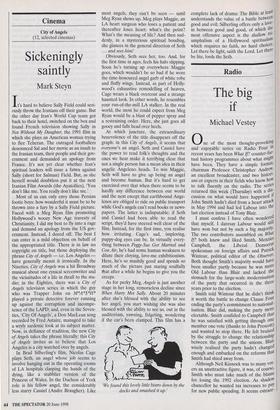The big if
Michael Vestey
i and enjoyable series on Radio Four in recent years has been What If? counter-fac- tual history programmes about what might have been. They have a simple format, chairman Professor Christopher Andrew., an excellent broadcaster, and two histon ans or experts in their fields who know how to talk fluently on the radio. The series returned this week (Thursday) with a dis- cussion on what would have happened if John Smith hadn't died from a heart attack in May 1994 and had led Labour into the last election instead of Tony Blair. I must confess I have often wondered that myself. I daresay Labour would still have won but not by such a big majoritY. The two contributors assembled on What If? both knew and liked Smith, Menzies Campbell, the Liberal Democrat spokesman on foreign affairs and Patrick Wintour, political editor of the Observer. Both thought Smith's majority would have been smaller partly because he was more Old Labour than Blair and lacked the stomach for the large-scale modernisation of the party that occurred in the three years prior to the election. Smith told Wintour that he didn't think it worth the battle to change Clause Four ending the party's commitment to national- isation. Blair did, making the party more electable. Smith confided to Campbell that he was satisfied with getting through one member one vote (thanks to John Prescott) and wanted to stop there. He felt bruised by the struggle to change the relationship between the party and the unions. Blair wisely realised the party hadn't changed enough and embarked on the reforms that Smith had shied away from. Although Neil Kinnock was to many vot- ers an unattractive figure, it was, of course, Smith who must take much of the blame for losing the 1992 election. As shadow chancellor he wanted tax increases to pay for new public spending. It seems extraor- dinary now but Smith would have increased income tax on anybody earning more than £23,000 a year whereas Kinnock had his doubts. Smith believed strongly in redis- tributive taxation in the Old Labour mould. Campbell thought it inconceivable Smith would have gone into the 1997 election accepting Tory spending plans for the next two years.
He reminded us that Gordon Brown wanted tax increases for those earning more than £50,000 a year and Smith would have agreed with that. Campbell and Win- tour were interesting on Smith's democrat- ic credentials or what seemed to be the lack of them. On devolution they both agreed there would not have been referen- dums in Scotland and Wales. Campbell said Smith took the view that devolution was 'the settled will of the Scottish people' and there was no need for a referendum. It's also clear the late Labour leader would never have committed himself to a referen- dum on joining the single currency. He was too pro-EU to have consulted the British people about the abolition of their curren- cy and their nation state. I remember once seeing Smith striding excitedly about that madhouse in Stras- bourg called the European Parliament, looking every inch a Eurocrat, wallowing in the febrile self-importance of the place. We have to remember that in 1971 Smith was one of 50 or so Labour rebels who defied a three-line whip to vote for Edward Heath's entry in principle to what was then the Common Market. In fact, the more I heard about Smith in this programme the more I shuddered at the thought of him forming a government, and the less I liked him. Win- tour said that with a Smith administration there would be less emphasis on driving up education standards. The problem is that just as one begins to believe the rhetoric of the Blair govern- ment, new policy is announced which con- tradicts it. I'm thinking of the news on Monday that David Blunkett, the educa- tion secretary, intends to control school admissions thus destroying excellent state schools that try to attract pupils with com- nutment. It must be in the spinning. The only good thing that seemed to emerge about Smith was that he didn't believe in Labour glitz. There would have been no Peter Mandelson and Alistair Campbell and no Millennium Dome. A civil servant would have been appointed press secretary at No. 10. Saying one thing and doing the opposite, which this government goes in for, was not his style. The two contributors could only specu- late about what Blair would be doing in a Smith government. He might just have made it to home secretary but it seems more likely he would have been given trade and industry, and we would all have been spared Blair mania. Next week's What If? is equally fascinating. It considers what would have happened if in 1642 the first major battle of the English Civil War, Edgehill, had been won decisively by either king or parliament, instead of ending in a draw. The Civil War would not have lasted for the six and a half years it did and the domestic and international ramifications would have been quite different.



























































 Previous page
Previous page